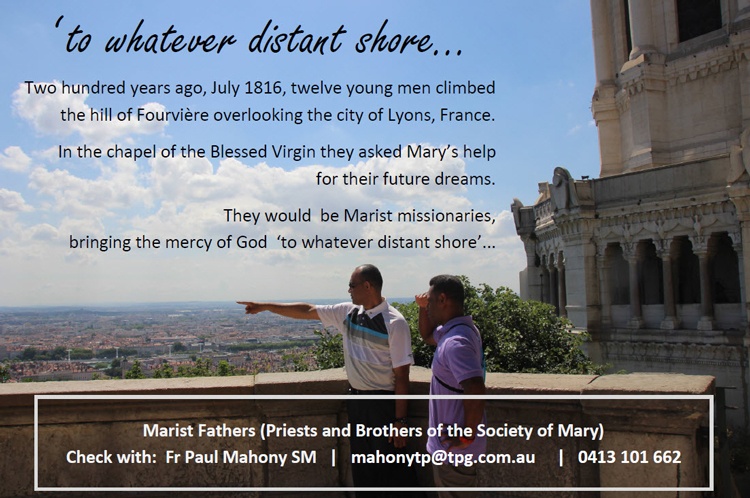“(Marists) desire to breathe (Mary’s) spirit …. They seek inspiration in the traditional phrase, ‘hidden and unknown in the world’. For Jean-Claude Colin it best captured, in the light of his spiritual and pastoral experience, Mary’s presence in the Church. They learn from him and like him from Mary, how to approach the work of evangelization so that Gospel may be received in all its power and charity. …. While Marists are willing to undertake any ministry that will help build up the Church for the sake of the world, they work in such a fashion that no one, as it were, notices their presence.” (Constitutions (1988), #9, #22, #23 & #25).
Thus, for the Marist, unknown and hidden (ignoti et occulti) refers to a way of being present in the apostolate, a certain manner of dealing with people, not an ascetical ideal. Marists do not strive to be hidden and unknown nor do they limit their works to those that are hidden and unknown. They do seek to become like Mary; they do “desire to breathe her spirit”. In this way they will proceed in all things as if hidden and unknown. This characteristic will emerge, as it were naturally, as pure grace. Thus Fr Colin says:
We must do good in a hidden way, take on all sorts of works, but always remaining ignoti et occulti. (A Founder Speaks, 167)
We can relate this to two other significant themes. The first is epitomized in John the Baptist’s prophetic role as the herald of Jesus – “He must grow greater, I must grow smaller” (John 3:30). The only reason John is there is because Jesus is there. John’s whole vocation is to make way for the Lord. Each of the baptized can say that of their vocation. Meister Eckhart picks up this theme in his famous phrase: “Get out of the way and let God be God in you!”
The second theme that is closely related to the hidden and unknown theme is brought into focus in the hymn in St Paul’s Letter to the Philippians, where we read: “He emptied himself” (2:7). We stand before a self-emptying God in whose image we are made. To be who and what we are, we too must be self-emptying. Needless to say, this way of thinking is profoundly counter-cultural. As such it is peculiarly suited to our times.
It is not surprising that Fr Colin strongly resisted any manner or behaviours that might be self-aggrandizing or self-centred in any way. Jean Coste reminds us, in particular, of his three ‘NOs’:
From the earliest texts we have by him right up to his final words to his Society, three very strong rejections are constantly present, three ‘NOs’ to the three forms of power which make up the apostle’s personal temptation: the power of money, decision-making responsibility, and personal prestige. (Jean Coste SM, “A Marian Vision of the Church,” originally published by the Centre D’Etude Saint-Louis-de-France.)
Justin Taylor SM describes concisely how the mission is shaped when we are hidden and unknown:
Mary provides a model of a style of behaviour that does not refuse to move into action, even on a big scale, but which is – to quote again the excellent formula of the Chapter of 1969-70 – ‘poor, lowly, without place of privilege, provided that Christ may be proclaimed’. Once we have given up, with Mary, all power for ourselves we will know how to walk alongside those who have no power; we will at last be able to speak with the true authority of the Gospel.
Jean Coste SM offers a useful summary on this theme:
Personally, I see that the Marist vocation is summarized whole and entire along the lines of ‘unknown and hidden’, in an understanding of the mystery of the hidden God in all its dimensions, and in an acceptance of that two-fold aspect of the hidden God: it entails comprehending from within the phenomenon of secularization, it entails full solidarity with those people for whom God is hidden (largely because of us), and at the same time, it entails keeping faith in the hidden God of the mystics, a sufficiently real faith so that other people might come and quench their thirst therein.’ (Jean Coste SM at Valpré, August 1988, Une vision mariale de l’église, p. 470f.)
